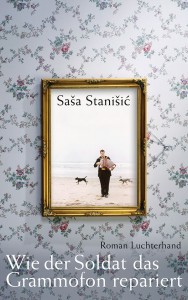A Novel – Not Just for Grown-ups
During the week of October 21 to 27, 2013 the Academy of the Jewish Museum Berlin, in cooperation with Kulturkind e.V., will host readings, workshops, and an open day for the public with the theme “Multifaceted: a book week on diversity in children’s and young adult literature.” Employees of various departments have been vigorously reading, discussing, and preparing a selection of books for the occasion. Some of these books will be introduced here over the course of the next few months.

The Hohenemser Literature Prize was recently given for the third time, an award bestowed upon German-language writers whose native language isn’t German. The call for submissions reads:
“In a convincing literary way, these writers should address not only emigrant experiences but also the intertwining of different cultural traditions and biographical influences. With a free choice of subjects, they will acknowledge the background of a continuously changing present – a present in which language, literature, and identity itself, can in no way be considered constants.”
The first prizewinner, in 2009, was Michael Stavaric, the author of Gaggalagu. This year the prize was given to Sasa Stanisic, who was born in 1978 in Bosnian Visegrad and moved to Germany in 1992 as a refugee of the civil war.
In his first published novel from the year 2006, How the Soldier Repairs the Gramophone, his hero Aleksandar Krsmanovic – “Comrade in Chief of the unfinished” – tells heart-wrenching stories full of black humor, narrated in the brightest colors, about life in Visegrad.
“I’m against endings, I’m against things being over. Being finished should be stopped! I am Comrade in Chief of going on and on, I support furthermore and et cetera!”
With the war, however, this “going on and on” ends irrevocably and Aleksandar flees with his parents to Germany. He tries to retrieve the time “back when everything was good” by re-inventing it. After a few years in Germany he writes to his friend Asija, who had remained in Bosnia:
“Asija, I can make Nazis think I’m from Bavaria just by using the words Bavarians like. I can make Frisian jokes, they’re a bit like Montenegrin jokes at home — if the Frisians’ flies aren’t open today they’ll wait until tomorrow to pee. I back five national teams. If anyone says I’m a good example of integration, it really freaks me out.”
 Even though How the Soldier Repairs the Gramophone isn’t written specifically for young adults, we’ve come to the conclusion that the novel is simply too good for the younger readers to pass by.
Even though How the Soldier Repairs the Gramophone isn’t written specifically for young adults, we’ve come to the conclusion that the novel is simply too good for the younger readers to pass by.
Sasa Stanisic actually received the Hohenemser Literature Prize not for this wonderful book, but rather for an excerpt from his second, still-unpublished, novel, whose story takes place in a village in the Uckermark region of northern Brandenburg. And since Aleksandar Krsmanovic, the Comrade in Chief of the unfinished, would freak out if we said anything here about integration and so forth, we’ll let it go for now.
Christine Marth, Publications
Sasa Stanisic, How the Soldier Repairs the Gramophone, translated from the German by Anthea Bell, Grove/Atlantic: New York 2008.
PS: Sasa Stanisic was also awarded the Alfred Döblin Prize for a different selection from the unpublished novel. This excerpt can be heard here in German.